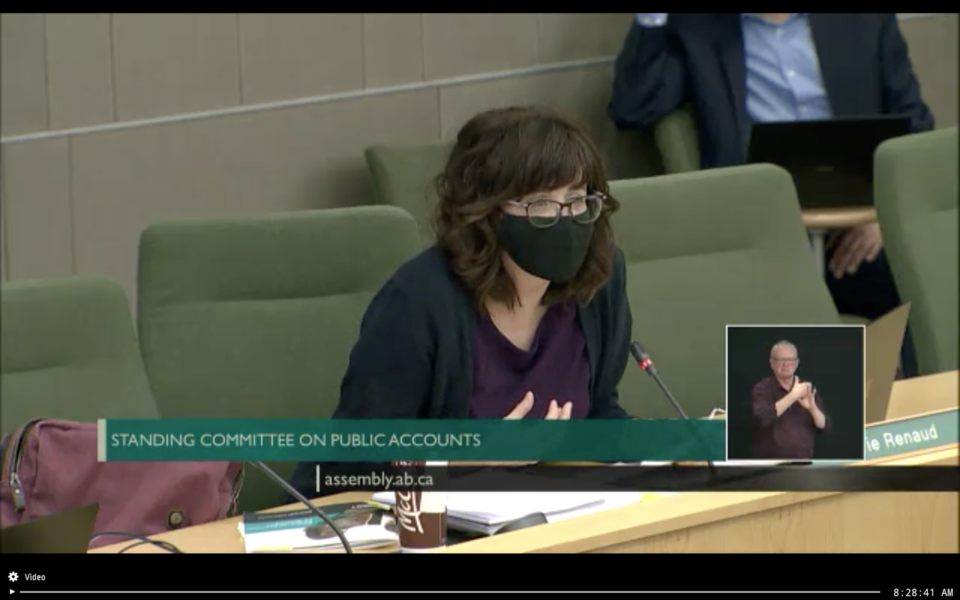St. Albert MLA Marie Renaud tried to get a sign-language interpreter for budget estimates for the Ministry of Community and Social Services this spring, but it didn’t happen. She did, however, have success with a recent Public Accounts Committee meeting.
“I think it's just important to get into the habit of doing everything we can to make our work accessible, like important announcements, ministry work, that is specific to the disability community, so it was really great that it happened,” said Renaud.
On May 18, a Public Accounts Committee meeting had a sign -language interpreter for the first time ever.
The meeting was with the Ministry of Community and Social Services and was a trial run for the possible expansion into other areas in the Legislature. House Speaker Nathan Cooper said it was a first step.
“We wanted to trial it to see how we might be able to integrate this service into other committees and other services that the Legislative Assembly Office provides,” said Cooper.
The Legislative Assembly Office has provided closed captioning services for quite some time, said Cooper. But many members in the assembly have been requesting interpretive services as well.
“I had a good chance to connect with the deaf community and really came to better understand why certain services, like we provided on Tuesday, are different than closed captioning, and ways that we can make the deaf and hard-of-hearing community feel more valued in our democracy,” said Cooper.
Part of the trial was to educate people about interpretive services, and some of it was to deal with technical challenges.
Some of the technical issues faced were related to having the interpretive services on the screen at all times, the location of the interpreter, and where the interpreter was standing.
Other issues included cameras, and making sure things were being recorded at all times, regardless of who was speaking, and where they were speaking from, as everything is being done virtually and not everyone is speaking from the same location.
Cooper said they are going to regroup and find ways they may be able to expand the services to all committee meetings.
“We're taking baby steps here. But ultimately, the sort of biggest goal would be to be able to provide these services inside the Legislature in some capacity or another,” he said.
They would start with daily coverage, said Cooper, which is Question Period and the introduction of bills. From there they could move on to gavel-to-gavel coverage. But these things take time.
From his perspective, Cooper said it is important to take steps to make our democracy more inclusive.
“While we might not be able to meet every need in the short term, we (can) slowly take positive steps forward in ensuring Albertans can see themselves reflected in our democracy,” he said.
The meeting was also the first Public Accounts Committee meeting for the ministry in four years, which Renaud chalked up to bad timing due to elections and being voted down when the committee has tried to make the ministry appear.
“I remember just being like, ‘Oh, rats, it's going to get bumped,’ ” she said.
Renaud has been on the committee for six years and said the meeting overall was frustrating.
“It's hard to get answers from ministry officials,” she said.
Renaud asked the ministry about issues regarding payment-date changes and whether or not there was appropriate consultation before changes were made. She asked about the re-allocation of $20 million to the Civil Society Fund and grant money for service dogs.
The biggest issue Renaud said she hears about from the disabled community is poverty.
“People can't afford to live where they're living. They are always behind on everything, they can’t afford things, they can't find affordable housing. They end up in really unsafe situations, whether living with people that are abusive, because they can't live on their own … and then, of course, all of the people that are waiting for service like disability supports. There are so many people on a wait list that can't get what they need,” she said.
Renaud said the community didn’t get any answers about their concerns because the committee is made to look backward, and she couldn’t ask anything about what is happening today.
“I don't think (the community) got (answers). I did get some and I'm hoping to get more with their written submission,” she said.




